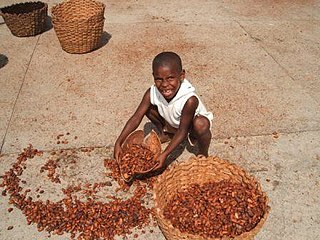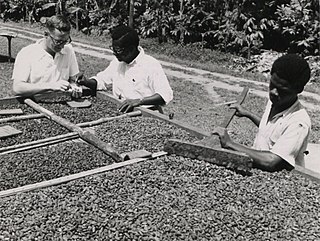Related Research Articles

Chocolate or cocoa is a food made from roasted and ground cocoa seed kernels that is available as a liquid, solid, or paste, either on its own or as a flavoring agent in other foods. Cocoa has been consumed in some form for at least 5,300 years starting with the Mayo-Chinchipe culture in what is present-day Ecuador. Later, Mesoamerican civilizations also consumed chocolate beverages, and it was introduced to Europe in the 16th century.

The cocoa bean, also known simply as cocoa or cacao, is the dried and fully fermented seed of Theobroma cacao, the cacao tree, from which cocoa solids and cocoa butter can be extracted. Cacao trees are native to the Amazon rainforest. They are the basis of chocolate and Mesoamerican foods including tejate, an indigenous Mexican drink.

The Hershey Company, often called just Hershey or Hershey's, is an American multinational confectionery company headquartered in Hershey, Pennsylvania, which is also home to Hersheypark and Hershey's Chocolate World. The Hershey Company is one of the largest chocolate manufacturers in the world; it also manufactures baked products, such as cookies and cakes, and sells beverages like milkshakes, as well as other products. The Hershey Company was founded by Milton S. Hershey in 1894 as the Hershey Chocolate Company, originally established as a subsidiary of his Lancaster Caramel Company. The Hershey Trust Company owns a minority stake but retains a majority of the voting power within the company.
Free the Slaves is an international non-governmental organization and lobby group, established to campaign against the modern practice of slavery around the world. It was formed as the sister organization of Anti-Slavery International but has since become a separate entity and has no relationship with it. The organization was created as a result of research done by Kevin Bales in his book, Disposable People: New Slavery in the Global Economy.

The Harkin–Engel Protocol, sometimes referred to as the Cocoa Protocol, is an international agreement aimed at ending the worst forms of child labor and forced labor in the production of cocoa, the main ingredient in chocolate. The protocol was negotiated by U.S. Senator Tom Harkin and U.S. Representative Eliot Engel in response to a documentary and multiple articles in 2000 and 2001 reporting widespread child slavery and child trafficking in the production of cocoa. The protocol was signed in September 2001. Joint Statements in 2001, 2005 and 2008 and a Joint Declaration in 2010 extended the commitment to address the problem.

Child labour is a recurring issue in cocoa production. Ivory Coast and Ghana, together produce nearly 60% of the world's cocoa each year. During the 2018/19 cocoa-growing season, research commissioned by the U.S. Department of Labor was conducted by NORC at the University of Chicago in these two countries and found that 1.48 million children are engaged in hazardous work on cocoa farms including working with sharp tools and agricultural chemicals and carrying heavy loads. That number of children is significant, representing 43 percent of all children living in agricultural households in cocoa growing areas. During the same period cocoa production in Cote d’Ivoire and Ghana increased 62 percent while the prevalence of child labour in cocoa production among all agricultural households increased 14 percentage points. Attention on this subject has focused on West Africa, which collectively supplies 69% of the world's cocoa, and Côte d'Ivoire, supplying 35%, in particular.
"Big Chocolate" is a business term assigned to multi-national chocolate food producers, akin to the terms "Big Oil," "Big Pharma," and "Big Tobacco".
Olam International is an agri-business company, operating in 60 countries and supplying food and industrial raw materials to over 20,900 customers worldwide, placing them among the world's largest suppliers of cocoa beans, coffee, cotton and rice. Its value chain includes farming, origination, processing and distribution operations, child labor, and allegedly even child slavery.

Ivory Coast leads the world in production and export of the cocoa beans used in the manufacture of chocolate. Despite producing over 45% of the world’s cocoa and receiving only about 4% of the $100 billion chocolate industry revenue, the 'Sweet Revolution' in Ivory Coast aims to create a fairer and more sustainable cocoa industry.
The "Faces of Freedom" photo exhibition is a collection of photographs captured by photo-journalist, filmmaker and human rights educator U. Roberto (Robin) Romano, during his travels to India, Nepal and Pakistan. Romano explores the exploitation of child labor in the production of handmade rugs in coordination with multiple international organizations, such as the World Bank, UNICEF, International Labour Organization and others to reduce the number of child laborers in that industry. The exhibit has been shown in many United States cities since its first exhibit in 2009. Faces of Freedom has been included in CNN Freedom Projects of modern slavery.
The environmental impact of cocoa production includes deforestation, soil contamination, and herbicide resistance. The majority of cocoa farms are now located in Côte d'Ivoire and Ghana.

Fair trade cocoa is an agricultural product harvested from a cocoa tree using a certified process which is followed by cocoa farmers, buyers, and chocolate manufacturers, and is designed to create sustainable incomes for farmers and their families. Companies that use fair trade certified cocoa to create products can advertise that they are contributing to social, economic, and environmental sustainability in agriculture.
Mondelez International, Inc., styled as Mondelēz International, is an American multinational confectionery, food, holding, beverage and snack food company based in Chicago. Mondelez has an annual revenue of about $26.5 billion and operates in approximately 160 countries. It ranked No. 108 in the 2021 Fortune 500 list of the largest United States corporations by total revenue.

Ghana is the second-largest exporter of cocoa beans in the world, after Ivory Coast. Ghana's cocoa cultivation, however, is noted within the developing world to be one of the most modelled commodities and valuables.
The World Cocoa Foundation is a non-profit membership organization with more than 90 member companies striving to make the cocoa supply chain more sustainable. WCF and its members are criticized for doing too little to end child labor, deforestation and extreme poverty, with their efforts dismissed as greenwashing and “a remarkable failure”. WCF's membership includes chocolate manufacturers such as Mondelez International, Nestlé, The Hershey Company and Mars, Inc. cocoa producers and suppliers such as Barry Callebaut and Cargill, shipping companies and ports and retailers such as Starbucks.
U. Roberto Romano (1956-2013), also known as Robin Romano, was an American documentary filmmaker, producer, photojournalist and human rights activist. He is known for directing Stolen Childhoods (2005), The Dark Side of Chocolate (2010) and The Harvest/La Cosecha (2010) and for campaigning against exploitative labor practices. In addition to filmmaking, Romano's photography documented child and migrant labor worldwide. The Romano archives are housed at the Thomas J. Dodd Research Center at the University of Connecticut.
Ivory Coast is a sub-Saharan nation in West Africa. It is a representative presidential democracy where rights are protected in the constitution, international law, and common law. As a member of the African Commission on Human and Peoples' Rights, it is a party to the African Charter on Human and Peoples' Rights and a signatory to major international human-rights agreements. In 2011, the Second Ivorian Civil War saw increases in violence and human-rights abuses. Although progress has been made towards reconciliation, the trial of former first lady Simone Gbagbo suggests that the root causes have not been addressed; no one has been convicted of crimes against humanity. According to a 2018 Human Rights Watch report, "Ongoing indiscipline by members of the security services and violent army mutinies demonstrated the precariousness of the country’s newfound stability."

Crime in Cote d'Ivoire is prevalent and versatile across the West African country. The most common forms of crime include child labour, arms trafficking, terrorism and human rights abuse. Other less common, but still evident types of crime include cannabis and synthetic drug trade, sex trafficking, fauna and flora crimes, cybercrime.
Nestlé USA, Inc. v. Doe, 593 U. S. ___ (2021), is a United States Supreme Court decision regarding the Alien Tort Statute (ATS), which provides federal courts jurisdiction over claims brought by foreign nationals for violations of international law. Consolidated with Cargill, Inc. v. Doe, the case concerned a class-action lawsuit against Nestlé USA and Cargill for aiding and abetting child slavery in Côte d’Ivoire by purchasing from cocoa producers that utilize child slave labor from Mali. The plaintiffs, who were former slave laborers in the cocoa farms, brought their claim in U.S. district court under the ATS.
Nestlé has been involved in a significant number of controversies and has been criticized a number of times for its business practices. Since the 1970s, the criticism of Nestlé increased, about the company's reported use of
References
- ↑ "Contact Database". Archived from the original on 2019-01-12. Retrieved 2012-11-08.
- ↑ COLUMN: Chocolate industry built on blood and sweat of child slaves Archived 2012-10-02 at the Wayback Machine , Lonnie Allen, Central Michigan Life , 18 October 2010 (retrieved 29 October 2010)
- ↑ Film Shows Cocoa Child Slavery Continues Archived 2016-04-01 at the Wayback Machine , Adrienne Fitch-Frankel, Fair Trade Blog, Global Exchange, 4 August 2010 (retrieved 29 October 2010)
- ↑ AFRICA: The Dark Side of Chocolate Archived 2018-02-27 at the Wayback Machine , Kate McMahon, CorpWatch, 25 October 2005 (retrieved 29 October 2012)
- ↑ The dark side of chocolate: Are candy companies doing enough to end child labor?, Sara Peck, "News Review", 05 August 2010 (retrieved 29 October 2012)
- ↑ Ghana Consultative Meeting 2010, Tulane University, 11 June 2010 (retrieved 6 November 2012)
- ↑ The dark side of chocolate: Are candy companies doing enough to end child labor?, Sara Peck, "News Review", 05 August 2010 (retrieved 29 October 2012)
- ↑ Child Labor in the Production of Cocoa, U.S. Department of Labor, retrieved 17 June 2021
- ↑ "Former TI Media exec Miki Mistrati launches factual prodco".
- ↑ Feature film exposes the dark side of treat, Jenny Jelen, Northern Life , 19 October 2010 (retrieved 20 October 2010)
- ↑ "The Dark Side of Chocolate - Miki Mistrati - BOLDtalks 2012". YouTube .
- ↑ Chocolate and Slavery Archived 2012-02-10 at the Wayback Machine , Samlanchith Chanthavong, "Chocolate and Slavery", 2002
- ↑ The dark side of chocolate: Are candy companies doing enough to end child labor?, Sara Peck, "News Review", 05 August 2010 (retrieved 29 October 2012)
- ↑ Miki Mistrati - da.wikipedia.com
- ↑ Miki Mistrati - LinkedIn